Promise Mascot Agency review
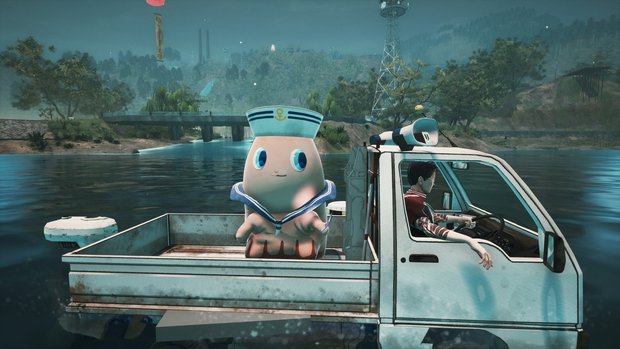
- 0 Comments
Repetition squanders some potential, but the wild and wacky genre-bender from the creators of Paradise Killer still manages to delight
When Paradise Killer was released in late 2020, it immediately became one of my favorite games that year. Naturally, when I heard Kaizen Game Works was working on a new game, this one focused on mascots and Yakuza crime families in small-town Japan, I was excited to see what they would cook up. Now that it’s here, is it the worthy follow-up to one of the most inventive, unabashedly bizarre murder mystery adventures of the past decade? The answer is a resounding: it depends. If you’re looking for another whodunit with political backstabbing of gods and goddesses in a dying world, you will be sorely disappointed. But if you’re looking for more of the studio’s bold creative vision and don’t mind significant repetition, this game could be the mascot management and open world crime drama experience you didn’t know you needed in your life.
Promise Mascot Agency takes place in an alternate universe modern-day Japan carved up by organized crime rivals, with an extensive backstory to digest. You play Michizane Sugawara – first lieutenant of the Shimazu family, known as “Michi” to his friends and “The Janitor” to his enemies. Michi is sent by Matriarch Shimazu to make a secret cash delivery for their parent organization, the Nakamura Alliance, to secure a valuable partnership between them and fellow crime organization the Hara Federation. The meeting goes disastrously, however, and Michi is forced to return home with no money and no alliance. Now, in order to pay off the family’s enormous debt, Michi is tasked with running the one business the Shimazu family has kept secret: a mascot agency in Kaso-Machi, a town cursed to slowly kill all Yakuza men who dare to enter its borders (including him).
What exactly is a mascot? In this world they are beings born from the earth who live alongside humans in everyday life. Imagine if someone twirling a sign advertising a seafood restaurant while wearing a cartoon crab costume actually was the crab. Mascots are fully sentient individuals with personalities and aspirations of their own. It just so happens that due to their typically cuddly appearance and marketable features, the vast majority of them end up working in advertising as the advertising. And as it so happens, mascots love to help promote businesses.
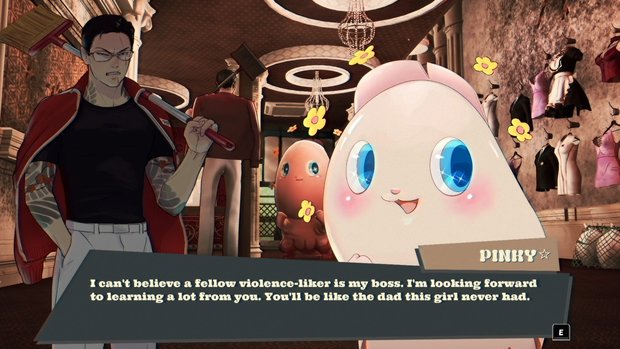
Then there’s the mascots of Kaso-Machi. Most of the successful mascots departed this forgotten town on the edge of civilization for stardom in the big cities long ago. The ones left behind are the misfits and weirdos, like a giant block of tofu who can’t stop crying, or a mascot resembling a cemetery burial mound. With slim pickings to hire from for the local mascot agency, the Shimazu family’s last untouched business slowly rotted away with no clients to market to and no mascots willing to join up.
When Michi arrives in Kaso-Machi, he meets his new partner: a mascot named Pinky☆ (yes, the star is part of her name), who resembles a severed toe with a small face in the middle. She has a cutesy voice, but she’s absolutely unhinged and makes jokes about dragging off dead bodies together when she realizes her new colleague is “The Janitor.” From here, it’s up to you to work with Pinky☆ to revitalize the dying agency, recruit any of the local misfits still available to work, and save up enough money for the family before Michi succumbs to the town curse.
The presentation of Promise Mascot Agency is delightfully stylish, with a punk grindhouse-meets-anime look that fits the game’s bizarre tone. Loading screens depict cute chibi-style animations of Michi and Pinky☆ driving around in Michi’s truck, and whenever you leave the titular agency, the screen fills up with stickers of the company logo before transitioning back to the impressively realized 3D open world. While I had to keep my eyes on the mini-map when exploring to make sure I didn’t get lost, there are plenty of standout locations in Kaso-Machi, from the towering tanuki statue submerged in the lake at the town’s entrance, to the mountainside hot spring bathhouse adorned with imagery of its hard-boiled egg mascot.
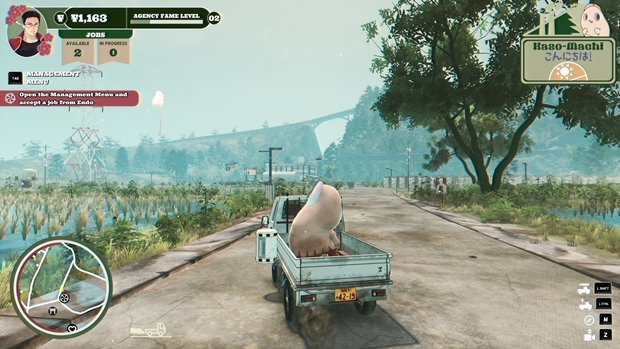
Everywhere you go, there is a subtle grainy and washed-out filter applied that evokes movies from the 70s on VHS that have been rewound one too many times. During conversation, all characters are portrayed as 2D stills that cycle between a few different poses depending on what’s being said, similar to the style of Paradise Killer, but everyone you meet also has a fully rendered 3D model in the game world, depicted in a lightly cel-shaded look. The music is also top-notch. Rather than the lo-fi funk of the developer’s previous game, the tracks here have a distinctly Japanese vibe that range in style from EDM to traditional acoustic melodies. It’s a sound all its own that fits the subject matter while keeping the tone consistent, even with the more out-there narrative elements – and believe me, they get out there.
The gameplay is split into three largely distinct styles: visual novel-style story sections, open world exploration, and a management simulator mixed with light card-based deck-building battles. The visual novel sections are pretty self-explanatory: You meet plenty of individuals and watch events unfold through text boxes of dialogue accompanied by large portraits of the characters in the foreground. The majority of them are voiced in Japanese by an impressive cast, headlined by Michi’s voice actor Takaya Kuroda. During some less pivotal narrative sections, characters may simply utter exclamations to show emotion rather fully voicing their lines, but even this small touch of vocalization makes the dialogue significantly more engaging.
Although exclusively in Japanese, the performances by the actors also give the characters an additional layer of personality that made me feel like I was really traveling around a cursed town in Japan inhabited by all sorts of bizarre individuals. Other than Michi, Pinky☆ is an absolute standout. She is a brilliant foil to the protagonist’s brooding no-nonsense attitude, constantly cracking jokes and poking fun at Michi for his angsty demeanor. She is your constant companion throughout the fifteen-plus hours it’ll take to reach this tale’s conclusion, and she quickly became my favorite character.
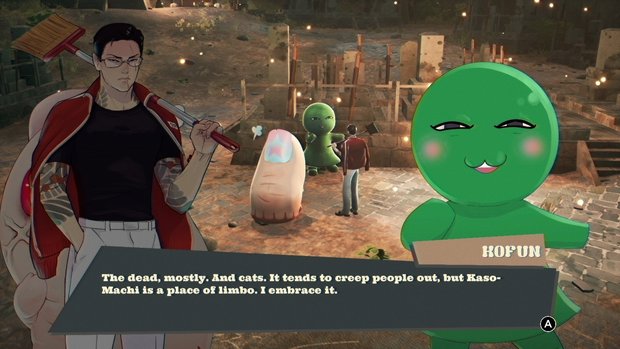
When you’re not interacting directly with others, you’ll spend your time exploring with a significant amount of freedom. You traverse the town in Michi’s comically small pickup truck, driving around with WASD if using a keyboard, or using right and left triggers to accelerate and brake if using a gamepad controller (which I did). Outside of the standard driving controls, you also have the ability to make the truck literally jump like it suddenly grew legs. It’s ludicrous in the best kind of way, and you can unlock additional optional abilities for your truck that get progressively more insane (the Pinky☆ cannon and glider wings are a couple of personal highlights). All controls for your truck’s abilities are displayed at the bottom right of the screen at all times, while current quests, the mini-map, and jobs/stats for your mascot agency are on the left (more on those in a bit).
Unfortunately, there is no option at first to get around other than driving your truck from point A to point B. This can be frustrating when trying to make a tight turn to investigate an item or pull up to a specific interaction point. I’m used to similar open world settings allowing you to step out of vehicles to navigate tight spaces or maneuver around environmental obstacles. Eventually you’ll unlock options for a fast travel system that negates a lot of this frustration, but I found it baffling that the game doesn’t allow for alternative methods until roughly halfway through. This is especially surprising considering your main goal for character quests is to find and pick up items. Having to drive long distances between points of interest, in conjunction with the difficulty getting around condensed spaces, quickly becomes tiresome.
This leads to the final, and sadly weakest, pillar of the Promise Mascot Agency gameplay experience: the management simulator with its associated mascot card battles. While traveling around Kaso-Machi, you’ll also search for mascots to hire. You start out with a low level of agency fame, with only one or two mascots willing to work for your team. You’ll have to raise your fame level by finishing quests for townsfolk, investing money into renovating failing businesses, and making improvements to your own building, using the money you make from sending your recruits to promotional mascot events.
Once you've invested enough money to have a business reopened, it will be available for mascot events as well, allowing for a larger pool of selectable locations to send your mascots for work. As you progress, you’ll also uncover town improvement programs that you can invest funds in. At first most of these improvements will be way beyond what Michi can afford, but after about the halfway point of my playthrough, I was starting to have trouble finding ways to spend all of the cash I was bringing in. Additional businesses will automatically open as you increase your agency fame level, with more relocating to Kaso-Machi as word of your success spreads.
Every mascot you hire has two individual attributes that dictate their effectiveness in their assigned jobs. These range from being food-related, to being scary, to being nerdy, among a number of other variations. Choosing a mascot with a desirable trait that works best with a particular business isn’t required, but it will provide a boost to the possible rewards. Mascot events are displayed as livestreams where the character you send has to accomplish some sort of task while promoting the business. Usually this is something silly like needing to fit through a normal-sized door (after much larger mascots have managed to get stuck) or having to stack a precarious number of cardboard boxes. The catch is, there’s always a hazard threatening to derail the promotion unless you can stop it. These confrontations play out like card-based, single hand RPG battles, only safer because you’re the only one dealing damage.
The challenges you face all have an associated type listed at the top right of the screen under their health bar: a malfunctioning cash register will have a gear denoting it’s tech-related, or a masked heckler causing your mascot to lose focus will be denoted with the icon of a person. While the obstacles and types may differ, every event plays out the same, with your mascot appearing on a set outside of whatever location is running the promotion. There they will deal a certain amount of damage up front based off their happiness level and other various stat determinants. Most of the time, however, your mascot will be unable to overcome the challenge on their own merits.
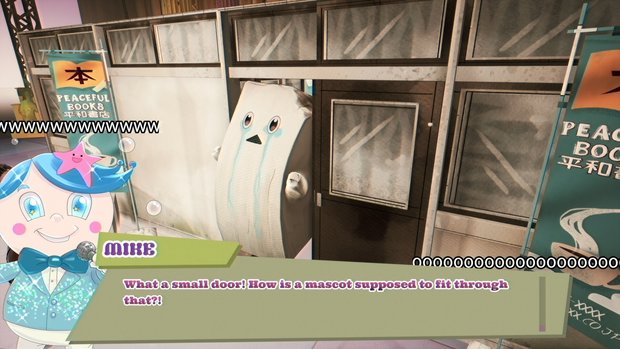
Thankfully, in a world of mascots, there are also Mascot Support Heroes. The majority of individuals you meet around town can become one; just ask them when you begin a conversation and most of them will agree. You will then add them to your team, not in person but as cards for your deck that can be used to help your mascot overcome event challenges. Whenever you make progress in finding an object for one of the town residents, you’ll typically receive an upgrade to their related hero card as well. This incentivizes completing as many town quests as possible in order to give a boost to the stats and abilities available in your card deck. Each card lists its own stats, including the amount of damage it will deal, and any additional effects the card may produce when played. Your deck of heroes is cumulative, and the more heroes you have recruited, the more cards you’ll have available.
After your mascot has dealt their initial damage score, a timer will begin ticking down 60 seconds in real time, during which you can begin selecting Mascot Support Heroes. You will start each event battle with two action points and draw a hand of five cards from your deck. At this point, you have the option to mulligan your hand up to two times to try for a better one. Each hero card costs a certain number of action points to play, and will have various stats that show their effectiveness against the challenge your mascot is facing. You will need to balance which cards you play with the optimal order to maximize their effectiveness.
Your goal is to cause enough damage with the cards in hand before either the timer hits zero or you run out of actions/cards to play. If you deal enough damage points to the disruption, your mascot will finish the challenge and receive all available rewards for a job well done – typically money, increased happiness, and other stat increases that allow them to take on still higher difficulty challenges with other businesses for even more rewards. If your mascot does not succeed, they’ll still complete the job but poorly, so they’ll receive fewer rewards, their happiness won’t increase, and their stamina will take a hit (giving them less energy to take on new jobs).
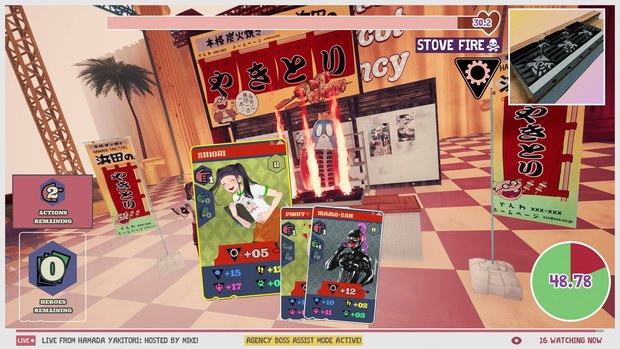
Failure is never particularly punishing – the only way you can actually come upon a true “Game Over” in Promise Mascot Agency is if you refuse to start sending money back to help Matriarch Shimazu after a specific point in the story – but you can help out your recruits by purchasing Mascot Support Items around Kaso-Machi that will decrease the difficulty of the challenges they may face on livestreams – or even allow them to avoid the challenges entirely and get all the benefits regardless.
At first I didn’t understand why I would want to avoid taking part in a mascot event with its simple but fun card battle system. Every job was a new chance to see the next zany obstacle lined up by the developers to challenge my mascots’ abilities, like walking down slippery stairs or taming a friendly dog. But then I recruited more mascots. And I sent those mascots on jobs. And then those mascots all needed my help with Mascot Support Heroes. After a few hours of recruiting and upgrading buildings to unlock new jobs to send mascots on, it started to become monotonous.
Aside from the repetition, I also took issue with the inconsequential nature of my mascot management. You’ll receive a notification whenever a mascot needs your help, along with a timer of in-game hours to respond. However, each call can be ignored and you’ll still get some reward for your mascot auto-completing the job without you. Not as much if they can’t successfully overcome their challenges, but otherwise there’s no major penalty for skipping out on helping them. Still, even though I could have chosen to be neglectful and benefited from the job anyway, there was never a time that I didn’t personally respond to a mascot distress call. In part that’s because mascots will start getting their own quests if their happiness levels increase enough, which gives them additional buffs upon completion that can help in future jobs. These add new layers of personality to every mascot you employ, and interacting with them is more engaging than the repetitive event challenges themselves.
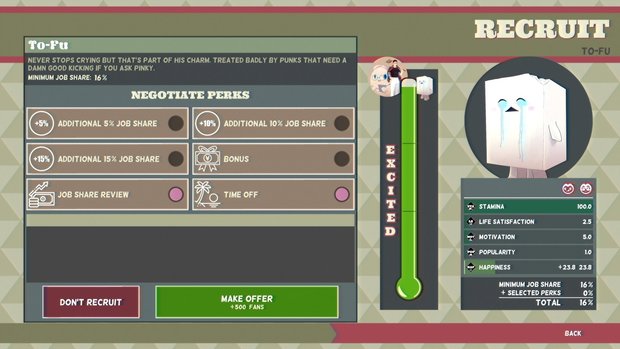
If all this wasn't complicated enough, there are still more elements to juggle. You will unlock the ability to hire subcontractor mascots in neighboring cities, which operate as simple income auto-generators after you hire them and assign them to a gig. Pinky☆ decides she wants to run for public office at one point, and from there you have to start tracking her standing in the voting polls, along with helping her respond appropriately when engaging in debate rallies to win voters. And merchandise depicting your mascots will become available to procure from giant crane games scattered around town, which can then be sold for additional profits as you continue growing your business.
I honestly felt bombarded by the number of mechanics the game kept throwing my way, especially since they began amounting largely to busywork. So why do I find myself fondly reflecting on my time with Promise Mascot Agency? There’s no puzzles to solve, no detective work to perform like there was in Paradise Killer, and the management simulation requires no complex strategy. Even as I watched the credits roll after my time in Kaso-Machi, I was having difficulty figuring out what exactly I liked about this game. I turned my brain off for much of the second half, as my efforts started to feel like something I had to do rather than wanted to do to progress the plot at that point.
And yet, it’s not the pursuit of dollars or battling nuisances or tediously running a fictional business that I keep thinking on even now – it’s the characters I grew to love, and a crime drama with twists and turns that kept throwing me for a loop every time I thought I had it figured out. It’s a testament to the game’s strong writing that my favorite character ended up being a sentient toe. But there are plenty more: I got to inspire a sentient block of tofu to be himself despite being cursed with constant crying no matter his emotional state. I trucked over a broken down arcade cabinet for a shoot-em-up obsessed mascot modeled after the kappa yokai from Japanese folklore, who couldn’t bow for fear of dropping the quarters he constantly kept stacked on his head. The bond between Michi and Pinky☆ is surprisingly heartfelt, and the themes of found family among the gang of misfits you employ really resonated with me.
As for the story itself, there’s a deep conspiracy surrounding the history of Kaso-Machi that comes to light through Michi’s actions. The connections between the Shimazu family and the cursed town become a main focus of the unfolding narrative, and Michi’s plight brings in several characters from high places to contend with the previously inconsequential Promise Mascot Agency. In between all of your management responsibilities, you’ll visit quest beacons on your map that provide points of interest and advance the main narrative, such as heading to the mayor’s mansion in one particularly dramatic (and comedic due to Pinky☆ insisting on using night vision goggles and code names for herself and Michi) section to investigate what he knows about the town’s dark history. My interest in getting to the root of the curse kept me invested in the world and characters more than I expected based on my increasingly lukewarm feelings about the minute-to-minute gameplay, and I’m glad I stuck with it because it all paid off in a satisfyingly poignant finale.
Final Verdict
Promise Mascot Agency is as difficult to rate as it is to describe. As fun as the concept is for a while, there’s no question that major gameplay elements overstay their welcome long before the end. But before that, and in between some of the tedium even later on, are some wonderfully absurd and surprisingly thoughtful interactions with memorably bizarre characters. There were times I found myself grinning like an idiot watching my truck fly around like a jet plane, with a giant toe wearing a pilot hat riding in the back. And that’s one of the main strengths of this game: it just goes places you wouldn’t imagine and gives no excuses for how weird it gets. Like its predecessor, though regrettably without its compelling investigative elements, this is another incredibly strange experience from Kaizen Game Works that won’t please everyone, but that’s not what it sets out to do. It takes on more than it can chew with the number of mechanics sometimes threatening to bog it down, but for those with patience and an open mind, this is a small-town misadventure you may be happy to find yourself lost in.
Hot take
It may not be everyone’s cup of tea, but for those looking something unlike anything else out there, Promise Mascot Agency offers a bizarre flavor of storytelling that feels inventive and fresh. It doesn’t have the staying power to keep its repetitive gameplay interesting throughout, but the richness of the world and unapologetic insanity more than make up for its excesses.
Pros
- Wonderfully weird writing drips with personality
- Brilliant soundtrack and entertaining Japanese voice-overs
- Memorable characters that balance absurdity with emotional depth
- Surprisingly heartfelt story about found family among misfits
- Pinky☆!
Cons
- Core gameplay loop is repetitive
- Over-abundance of mechanics
- Clunky open world traversal, largely due to restrictive vehicular controls
Sam played Promise Mascot Agency on PC using a review code provided by the game's publisher.


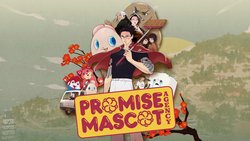
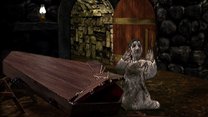
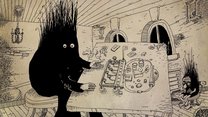

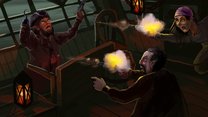
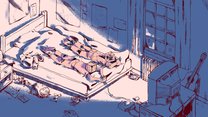



0 Comments
Want to join the discussion? Leave a comment as guest, sign in or register in our forums.
Leave a comment